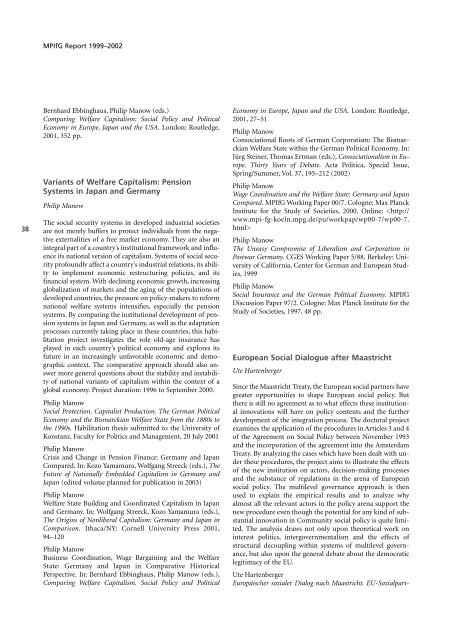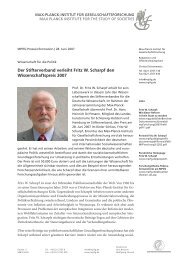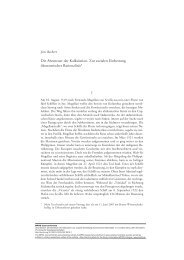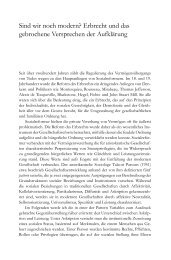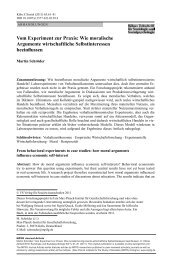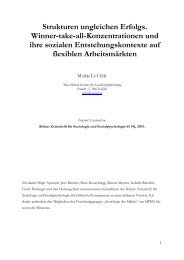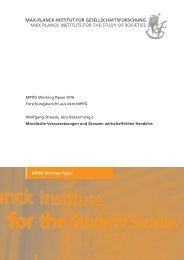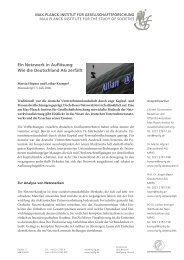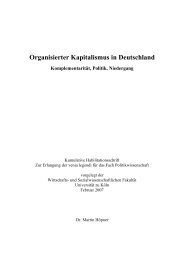Publications - MPIfG
Publications - MPIfG
Publications - MPIfG
Create successful ePaper yourself
Turn your PDF publications into a flip-book with our unique Google optimized e-Paper software.
38<br />
<strong>MPIfG</strong> Report 1999–2002<br />
Bernhard Ebbinghaus, Philip Manow (eds.)<br />
Comparing Welfare Capitalism: Social Policy and Political<br />
Economy in Europe, Japan and the USA. London: Routledge,<br />
2001, 352 pp.<br />
Variants of Welfare Capitalism: Pension<br />
Systems in Japan and Germany<br />
Philip Manow<br />
The social security systems in developed industrial societies<br />
are not merely buffers to protect individuals from the negative<br />
externalities of a free market economy. They are also an<br />
integral part of a country’s institutional framework and influence<br />
its national version of capitalism. Systems of social security<br />
profoundly affect a country’s industrial relations, its ability<br />
to implement economic restructuring policies, and its<br />
financial system. With declining economic growth, increasing<br />
globalization of markets and the aging of the populations of<br />
developed countries, the pressure on policy-makers to reform<br />
national welfare systems intensifies, especially the pension<br />
systems. By comparing the institutional development of pension<br />
systems in Japan and Germany, as well as the adaptation<br />
processes currently taking place in these countries, this habilitation<br />
project investigates the role old-age insurance has<br />
played in each country’s political economy and explores its<br />
future in an increasingly unfavorable economic and demographic<br />
context. The comparative approach should also answer<br />
more general questions about the stability and instability<br />
of national variants of capitalism within the context of a<br />
global economy. Project duration: 1996 to September 2000.<br />
Philip Manow<br />
Social Protection, Capitalist Production. The German Political<br />
Economy and the Bismarckian Welfare State from the 1880s to<br />
the 1990s. Habilitation thesis submitted to the University of<br />
Konstanz, Faculty for Politics and Management, 20 July 2001<br />
Philip Manow<br />
Crisis and Change in Pension Finance: Germany and Japan<br />
Compared. In: Kozo Yamamura, Wolfgang Streeck (eds.), The<br />
Future of Nationally Embedded Capitalism in Germany and<br />
Japan (edited volume planned for publication in 2003)<br />
Philip Manow<br />
Welfare State Building and Coordinated Capitalism in Japan<br />
and Germany. In: Wolfgang Streeck, Kozo Yamamura (eds.),<br />
The Origins of Nonliberal Capitalism: Germany and Japan in<br />
Comparison. Ithaca/NY: Cornell University Press 2001,<br />
94–120<br />
Philip Manow<br />
Business Coordination, Wage Bargaining and the Welfare<br />
State: Germany and Japan in Comparative Historical<br />
Perspective. In: Bernhard Ebbinghaus, Philip Manow (eds.),<br />
Comparing Welfare Capitalism. Social Policy and Political<br />
Economy in Europe, Japan and the USA. London: Routledge,<br />
2001, 27–51<br />
Philip Manow<br />
Consociational Roots of German Corporatism: The Bismarckian<br />
Welfare State within the German Political Economy. In:<br />
Jürg Steiner, Thomas Ertman (eds.), Consociationalism in Europe.<br />
Thirty Years of Debate. Acta Politica, Special Issue,<br />
Spring/Summer, Vol. 37, 195–212 (2002)<br />
Philip Manow<br />
Wage Coordination and the Welfare State: Germany and Japan<br />
Compared. <strong>MPIfG</strong> Working Paper 00/7. Cologne: Max Planck<br />
Institute for the Study of Societies, 2000. Online: <br />
Philip Manow<br />
The Uneasy Compromise of Liberalism and Corporatism in<br />
Postwar Germany. CGES Working Paper 5/88. Berkeley: University<br />
of California, Center for German and European Studies,<br />
1999<br />
Philip Manow<br />
Social Insurance and the German Political Economy. <strong>MPIfG</strong><br />
Discussion Paper 97/2. Cologne: Max Planck Institute for the<br />
Study of Societies, 1997, 48 pp.<br />
European Social Dialogue after Maastricht<br />
Ute Hartenberger<br />
Since the Maastricht Treaty, the European social partners have<br />
greater opportunities to shape European social policy. But<br />
there is still no agreement as to what effects these institutional<br />
innovations will have on policy contents and the further<br />
development of the integration process. The doctoral project<br />
examines the application of the procedures in Articles 3 and 4<br />
of the Agreement on Social Policy between November 1993<br />
and the incorporation of the agreement into the Amsterdam<br />
Treaty. By analyzing the cases which have been dealt with under<br />
these procedures, the project aims to illustrate the effects<br />
of the new institution on actors, decision-making processes<br />
and the substance of regulations in the arena of European<br />
social policy. The multilevel governance approach is then<br />
used to explain the empirical results and to analyze why<br />
almost all the relevant actors in the policy arena support the<br />
new procedure even though the potential for any kind of substantial<br />
innovation in Community social policy is quite limited.<br />
The analysis draws not only upon theoretical work on<br />
interest politics, intergovernmentalism and the effects of<br />
structural decoupling within systems of multilevel governance,<br />
but also upon the general debate about the democratic<br />
legitimacy of the EU.<br />
Ute Hartenberger<br />
Europäischer sozialer Dialog nach Maastricht. EU-Sozialpart-


